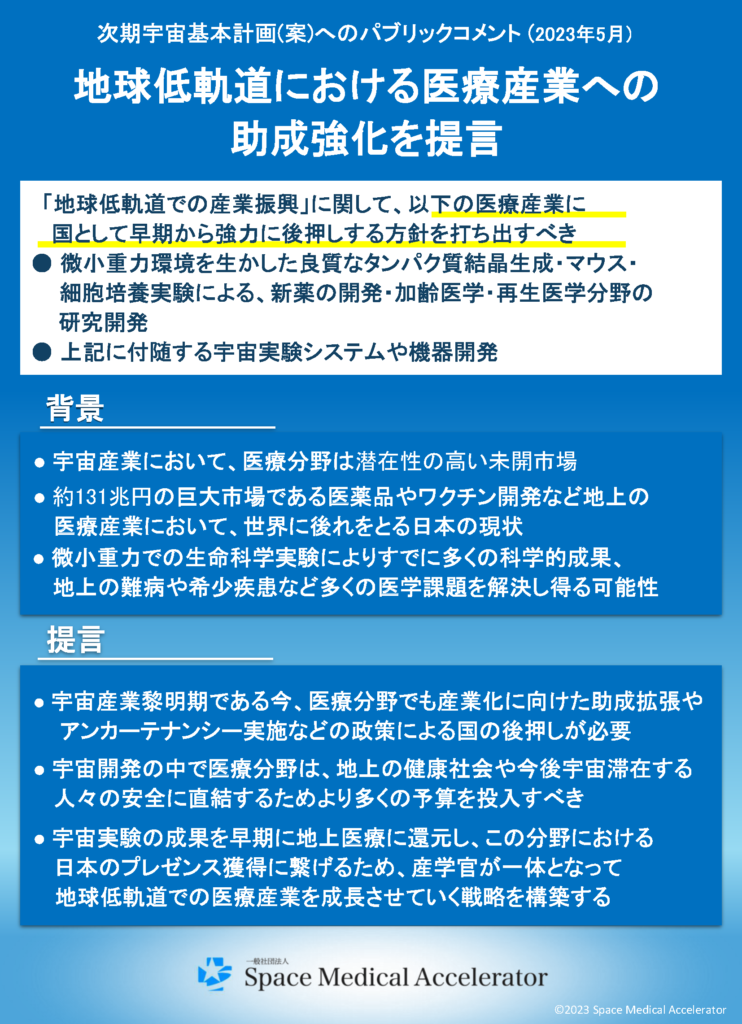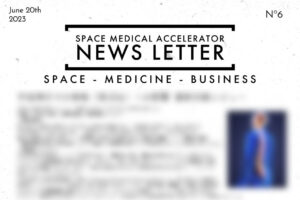We, Space Medical Accelerator, have submitted public comments on the next draft of the Space Master Plan.

The following is the original text.
▪️ Space Basic Policy – SMA – Draft Public Comment
2. objectives and vision for the future
(3) Creation of new knowledge and industries in space science and exploration
With regard to “industrial promotion in low Earth orbit,” we believe that the government should promptly establish a policy to strongly support the medical industry, including drug discovery, aging and regenerative medicine research through protein crystal generation, mouse and cell culture experiments, and the development of accompanying experimental systems and equipment on the ISS and its successor commercial stations. We believe that the Japanese government should immediately establish a policy to strongly support the medical industry in drug discovery, aging medicine, and regenerative medicine research through mouse, cell, and culture experiments, and the development of accompanying experimental systems and equipment.
In the recent space market entry of private companies, the medical field is still an immature industry, while the transportation and satellite data fields are booming. On the other hand, research on drug discovery, aging, and regenerative medicine in microgravity has the potential to solve many medical problems such as intractable diseases, rare diseases, and medical care for the elderly on the ground. The results of these experiments will be returned to society on the ground as soon as possible. In order to return these results to the ground society at an early stage and to gain Japan’s presence in the medical field, a strategy is needed to make low orbit medical research and medical technology development a growth industry through public-private partnership.
While pharmaceutical development requires huge R&D expenditures, it is a huge market of 131 trillion yen worldwide (as of 2019), and countries are competing with each other because the development of a single drug can save many patients. However, Japan is behind Western countries in terms of funding and R&D capabilities in areas such as drug and vaccine development, and even in the case of the Corona disaster, Japan had to rely on imports for many of the vaccines it needed. In the field of medical care, it is necessary to invest funds in areas that will surely be needed in the future, and to have a policy that encourages private sector participation and competition to grow the market. In space development, the medical field will benefit people on the ground, so it is easy to gain public understanding to invest in cutting-edge research. In addition, JAXA is one of the top class space agencies in terms of the ratio and level of medical research on the ISS, and this is an area where Japan’s space development should be a strong point.
These are consistent with the basic stance in promoting space policy (4) Strategic fostering and support of internationally competitive companies.
Just as the government needed to support the industrialization of the Internet when it first appeared in the digital field, Japan can lead the world in solving global issues such as the elucidation of the pathology of intractable diseases and aging and the development of treatment methods by setting policies such as expanding subsidies and anchor tenancy for the medical industry in low orbit, now that the space industry is in its early days. We believe that Japan has the potential to lead the world in solving global issues such as the elucidation of the pathophysiology of intractable diseases and aging, and the development of treatment methods.
View the outline of the draft of the next basic plan for space>>>


